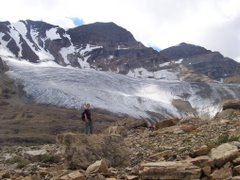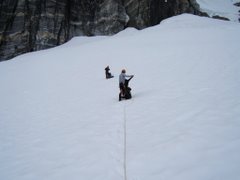 On February 4th, Bush sent the FY09 Budget request to Congress. This means a shuffle of money for the sciences with the DOE expecting gains (avert the energy crisis) and losses for the DIH and USGS (among others). What can we do? I am particularly upset that the Nataional Water Quality Assessment Program (NAWQA) will suffer budget reductions of over $10 Million (with a new annual budget of 54.1 Million). During the summer I was 19, I worked for the Minnesota NAWQA as a UNIX-GIS mapper as part of an effort to monitor the health of the Red River and Mississippi Basins. A few years later, I found my way back to NAWQA as a undergraduate hydrology employee for the Wisconsin office. Maybe I was young and impressionable, but my memory hasn't faded. I cannot say enough about NAWQA and the importance of their efforts. The long term data sets established by NAWQA provide a sense of the changing quality of our waterways through time and space. This information is necessary to evaluate our past, current, and future water management practices. NAWQA also provides a baseline of hydrology data that complements new research on hot topics.
On February 4th, Bush sent the FY09 Budget request to Congress. This means a shuffle of money for the sciences with the DOE expecting gains (avert the energy crisis) and losses for the DIH and USGS (among others). What can we do? I am particularly upset that the Nataional Water Quality Assessment Program (NAWQA) will suffer budget reductions of over $10 Million (with a new annual budget of 54.1 Million). During the summer I was 19, I worked for the Minnesota NAWQA as a UNIX-GIS mapper as part of an effort to monitor the health of the Red River and Mississippi Basins. A few years later, I found my way back to NAWQA as a undergraduate hydrology employee for the Wisconsin office. Maybe I was young and impressionable, but my memory hasn't faded. I cannot say enough about NAWQA and the importance of their efforts. The long term data sets established by NAWQA provide a sense of the changing quality of our waterways through time and space. This information is necessary to evaluate our past, current, and future water management practices. NAWQA also provides a baseline of hydrology data that complements new research on hot topics.In Science Magazine, the Chief Executive of the American Association for the Advancement of Science (AAAS), Alan Leshner, urged (2/15/08)
"We should take up "glocal" science advocacy to complement the traditional approach. This strategy involves taking a global issue and making it meaningful to society at the local level. Scientists and citizen advocates should recruit their nonscience friends and neighbors to promote science funding to decision-makers. Recruiting efforts can be as simple as discussing science-related issues at dinner parties or as ambitious as meeting with community groups, school boards, or city council members. The appeal should be locally focused for two important reasons: Policy-makers often seem to listen better in their home districts, where they are less distracted by the press of life on Capitol Hill; and they need to see clearly that science funding is not only a national but a local issue for all their constitutents, not just those who are scientists."
As mentors to K-12 and undergraduate students, we must build classes with local relevance... this is especially important to introductory science classes, where students may receive their only exposure to conducting, evaluating, and valuing scientific research.



No comments:
Post a Comment